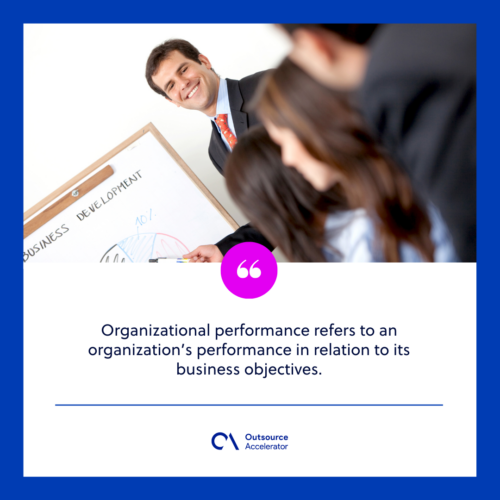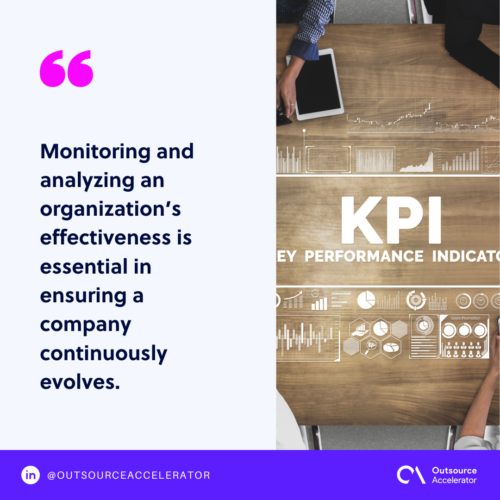Organizational performance 101

A business can spend hours and thousands of dollars working with consultants to create a bulletproof organization, but the journey does not stop there. It requires constant work and monitoring to ensure that your company stays competitive in an ever-changing market.
To start, you need to understand what organizational performance means.
This article will cover organizational performance basics, its various types, and performance indicators.
Defining organizational performance
Organizational performance refers to an organization’s performance in relation to its business objectives.
This includes internal and external comparisons, such as yearly organization performance in comparison to its competitors in the industry or on a larger scale.
Checking business performance is essential to any business playbook. When incorporated into your process, it can allow you to consistently stay on track with your objectives and help your business adapt to challenges you may encounter.

Types of organizational performance
Organizational performance can be divided into three subcategories. It covers different aspects of doing business, such as marketing and finance.
Here are three of the most common organizational performance types.
Financial performance
The financial performance of a company shows how profitable it is. It involves revenues, assets, liabilities, and stakeholders.
These measures are taken over time to identify trends and help decipher the underlying core performance that drives company success.
Market performance
Market performance is an important measure of success for a product or company and indicates how well it performs in the marketplace.
It shows how well a solution meets the demands of users and how satisfied customers are with what they have purchased. This is where companies can tell if their solutions and campaigns have helped them grow market share.
Operational performance
Operational performance refers to the process of measuring a firm’s performance against standard or prescribed indicators of effectiveness, efficiency, and environmental responsibility, such as cycle time, productivity, waste reduction, and regulatory compliance.
It must be tracked and analyzed continuously to guide day-to-day activities so that processes remain efficient, effective, and environmentally sound.
Three Ps of organizational performance
People, processes, and products are the three pillars of organizational performance.
People
Manpower is one of the greatest assets of a business. Your employees execute your company’s strategy and processes—without their effort in everything from customer service to new product development, you wouldn’t have any results to speak of.
Ensuring that people in your company are happy is an important part of having a fully functioning organization.
Process
Processes are the procedures that guide how work gets done within an organization—they can either be formal (like a checklist) or informal (like best practices).
The more reliable and consistent they are across departments helps ensure that all employees have access to the information they need to do their jobs well.
Product
Your product line should be practical, purposeful, and profitable.
Having a strong product line opens the door to other new business opportunities. This can lead to increased revenue, brand recognition, and customer loyalty.
Key performance indicators in measuring organizational performance
Monitoring and analyzing an organization’s effectiveness is essential in ensuring a company continuously evolves. Varied KPIs for your organization enable a more holistic view of how well an organization is doing.
Productivity
Productivity KPIs measure the efficiency and effectiveness of your business processes. They show how well you are meeting your goals, what is working, and what could be improved.
By tracking productivity regularly, you gain insight into how changes in your business may affect productivity and plan ahead to meet major challenges.
Assessing productivity may include counting how many projects were accomplished, products created, and other factors specific to a company’s offers.
Strong corporate culture
Strong cultures emerge when employees believe they are working toward a shared vision and values. Cultures should be defined and communicated clearly, and be dynamic and evolving.
An effective organization cultivates a positive culture that can improve how your teams function and communicate. This also has a lasting effect on your company’s success. It can help companies by fostering a strong service culture and strengthening their brand image.
Employee retention
The employee experience is essential to aligning your company’s culture with employee needs. It can encompass anything from communications to policy, benefits, and tools.
A company’s employee retention rates can help indicate how attuned they are to their employees’ needs for culture and development. It can help demonstrate a healthy organization and drive morale across the company.

Getting started in measuring your organizational performance
Organizational performance is one of the most critical aspects of business, requiring research and analysis before any changes can be made.
To improve your organization’s performance, begin by gathering information about its current state. This will help you determine where improvements are needed and what action plan would be most effective for your company.
A practical action plan should include both people and processes and account for technology. Finally, ensure that everyone involved with the process understands their role and how they contribute to achieving success.







 Independent
Independent




